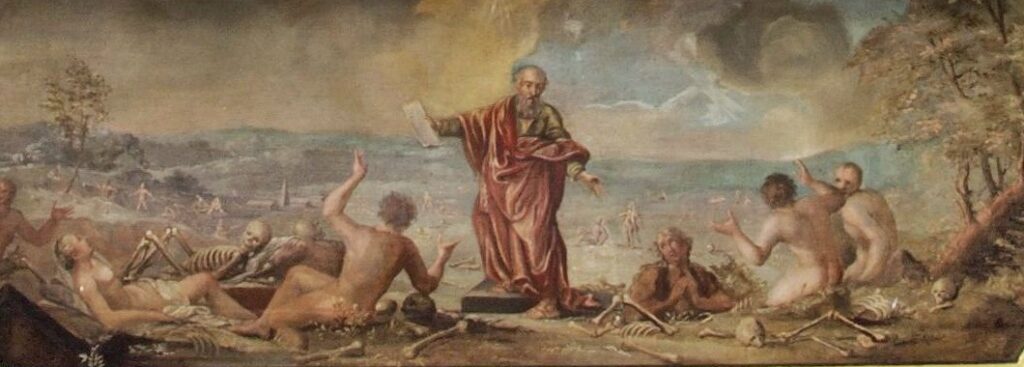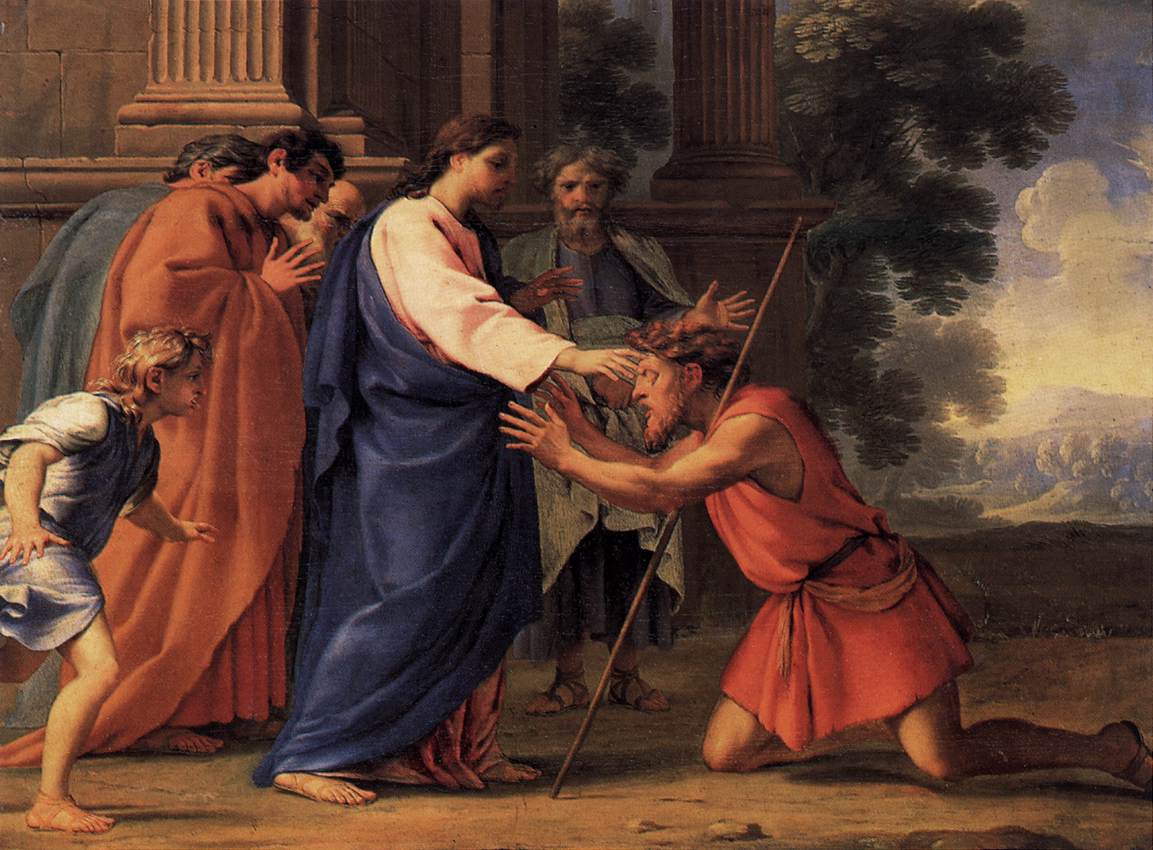FROM FRACTURED TO FORGED AND FUSED
Ezekiel 37:1-14
Fifth Sunday in Lent
Analysis by Matthew DeLoera
1The hand of the Lord came upon me, and he brought me out by the spirit of the Lord and set me down in the middle of a valley; it was full of bones. 2He led me all round them; there were very many lying in the valley, and they were very dry. 3He said to me, ‘Mortal, can these bones live?’ I answered, ‘O Lord God, you know.’ 4Then he said to me, ‘Prophesy to these bones, and say to them: O dry bones, hear the word of the Lord. 5Thus says the Lord God to these bones: I will cause breath to enter you, and you shall live. 6I will lay sinews on you, and will cause flesh to come upon you, and cover you with skin, and put breath in you, and you shall live; and you shall know that I am the Lord.’
7 So I prophesied as I had been commanded; and as I prophesied, suddenly there was a noise, a rattling, and the bones came together, bone to its bone. 8I looked, and there were sinews on them, and flesh had come upon them, and skin had covered them; but there was no breath in them. 9Then he said to me, ‘Prophesy to the breath, prophesy, mortal, and say to the breath: Thus says the Lord God: Come from the four winds, O breath, and breathe upon these slain, that they may live.’ 10I prophesied as he commanded me, and the breath came into them, and they lived, and stood on their feet, a vast multitude.
11 Then he said to me, ‘Mortal, these bones are the whole house of Israel. They say, “Our bones are dried up, and our hope is lost; we are cut off completely.” 12Therefore prophesy, and say to them, Thus says the Lord God: I am going to open your graves, and bring you up from your graves, O my people; and I will bring you back to the land of Israel. 13And you shall know that I am the Lord, when I open your graves, and bring you up from your graves, O my people. 14I will put my spirit within you, and you shall live, and I will place you on your own soil; then you shall know that I, the Lord, have spoken and will act, says the Lord.’

Ezekiel and the dry bones //commons.wikimedia.org/wiki/File:Sankt_Michael_(Freiburg)_jm4518.jpg , cropped.
Exile is not the last word, and wilderness is not the end of the road. God refuses to leave dry bones lying asunder. God will not abandon these people, despite everything that has come before; even their abject faithlessness does not deter God.
DIAGNOSIS: Torn Asunder
Step 1: Initial Diagnosis (External Problem): Fractured
Grounding: God calls Ezekiel into the office of prophet at a particularly challenging time—perhaps a few years after having been carted off into the Babylonian exile with a score of others from Judah. Babylon is very much a wilderness for these folks. It’s an alien place—a place in which they should never have found themselves, yet there they are. Stripped of everything they had and were, these are “walking dead” or “very dry bones.”
Tracking: How often do we find ourselves in a wilderness place and time, where our lives have become derailed? Children of the 80s might recall David Byrne’s lament in the Talking Heads song, “Once in a Lifetime”: Where is that “large automobile,” or “beautiful house,” or “beautiful wife”? But we may just as likely be confronted with things that are less conspicuously “#firstworldproblems.” Loss, trauma, and cascading misfortunes strike all of us, as surely as God “sends rain on the righteous and on the unrighteous” (Matt 5:45), leaving our own bones quite “dry.”
Step 2: Advanced Diagnosis (Internal Problem): Broken
Grounding: Ezekiel heeds God’s command to speak a powerful word to the dry bones arrayed before him, and this word does what it says: “The breath came into them, and they lived, and stood on their feet.” Yet even this miraculous gift of resurrection is not enough. With the very same breath that was just given to them, these resurrected bodies still lament, “Our bones are dried up, and our hope is lost; we are cut off completely.” They remain in exile, and it still weighs heavily upon their minds and hearts.
Tracking: On the one hand, our dry bones aren’t scattered on the ground (in our case, not literally). Shouldn’t we be able to appreciate that the last word hasn’t yet been written? After all, we still live in defiance of everything arrayed against us. But on the other hand, we remain in a wilderness that keeps us feeling abandoned and utterly cut off from life, liberty, and the pursuit of happiness.
Step 3: Final Diagnosis (Eternal Problem): Lying Asunder
Grounding: God commands Ezekiel to speak another word to the resurrected bodies that now stand before him—a promise. And this is not just God’s promise coming (“I will place you on your own soil; then you shall know that I, the Lord, have spoken and will act”), but God’s promise kept (“I will put my spirit within you, and you shall live”). What God is really promising, is the gift of wholeness and restoration, and this is far from the first time that God had sent a prophet to speak the very same promise. Yet, to these resurrected hearts and minds, the promise has remained as unconvincing and incomplete as ever. After all, Babylon swept them all away as if God had never given any promise at all. Why should they trust now? Perhaps it would have been better to leave dry bones lying asunder.
Tracking: Are we any more convinced of the promises that God makes to us? Seeing is believing, and our bones still look and feel as dry as ever.
PROGNOSIS: Mended
Step 4: Initial Prognosis (Eternal Solution): Bound to Jesus
Grounding: Exile is not the last word, and wilderness is not the end of the road. God refuses to leave dry bones lying asunder. God will not abandon these people, despite everything that has come before; even their abject faithlessness does not deter God. That God calls Ezekiel to speak a word in defiance of death and destruction only underscores a fidelity that exceeds human comprehension. After all, despite the lament that “our bones are dried up,” this is no longer the case—dry bones do not know that they are dry, and these bones now surely live.
Crossing: We witness the same power of resurrection in Jesus’ own body, crucified and risen. And this is not just for Jesus’ own sake, but for ours as well, “for if we have been united with him in a death like his, we will certainly be united with him in a resurrection like his” (Rom. 6:5). Jesus only underscores and reinforces the present reality of this promise by binding our bones to his through his own body and blood.
Step 5: Advanced Prognosis (Internal Solution): Forgiven
Grounding: Granted, the people remain in exile and continue to lament that they have been cut off. Yet, Ezekiel will continue to preach the word of life to these people, and perhaps they will finally come to understand the words of another prophet, Jeremiah: “But seek the welfare of the city where I have sent you into exile, and pray to the LORD on its behalf, for in its welfare you will find your welfare” (Jer. 29:7).
Crossing: In this way, the faith that Jesus imparts to us through his Spirit asks, “Is exile really exile after all?” Because Jesus continues to abide with us and to speak his life-giving word of forgiveness to us, we realize that despite our plans and former aspirations having been derailed, we are very much still here. Of course, the wounds that have been inflicted upon us, or which we may even have inflicted upon ourselves, remain. Yet, even these are a gift, because now we know that hope and lament are two sides of the same coin. Surely this is the pathos that underlies some of our most cherished stories and moments. I’m reminded of Ezra 3:13: “The people could not distinguish the sound of the joyful shout from the sound of the people’s weeping.”
Step 6: Final Prognosis (External Solution): Forged and Fused
Grounding: Though it lies outside of this lection, and beyond the imagination of the people, God will indeed eventually deliver them back to Judah by the hand of Cyrus the Persian (Ezra 1:1-11). Of course, God going outside the house of David is quite a controversial choice. But at the same time, this underscores the shocking ways that God is reconciling all things to God’s own self, even in the midst of the most seemingly insurmountable wilderness.
Crossing: Faith is not easy. We will continue to have dark nights of the soul as we question why God preserves our bodies but seems indifferent to our feelings. Yet, it’s also true that our bodies matter for our neighbors. We do not like exile or wilderness, yet perhaps only by these have we been brought into contact with the neighbors we now find arrayed before us—folks who know full well what derailment feels like. Shared adversity is a curious way to foster relationships of mutual care and concern—an experience we might consider as “the mutual conversation and consolation” of the saints. Besides, when we’re in this present wilderness together, perhaps it won’t seem so “wild” with company.





You must be logged in to post a comment.